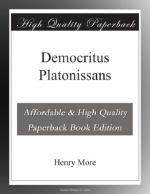|
This section contains 257 words (approx. 1 page at 300 words per page) |
World of Chemistry on Democritus
Democritus's background is uncertain. Many stories of his life are tradition or later inventions. Among the few undisputed facts are his birthplace (Abdera, Thrace) and his teacher (Leucippus). Only fragments of his writings survived, and many of them concerned ethics. Most of the knowledge of Democritus's scientific ideas came from his students, especially Nausiphanes, the teacher of Epicurus.
According to Democritus, the physical universe was composed of atoms and void. An infinite number of atoms were in perpetual motion throughout the void. An atom was an eternal, unchangeable, solid body without pores or voids, so small it could not be seen or divided (the word atomon means indivisible). Atoms only differed from each other in shape, size, arrangement and position, which explained the properties of different substances. For example, water atoms were smooth and round so water flowed easily and had no permanent shape. Contrarily, atoms of fire, which were thorny caused pain, and atoms of earth which were jagged and rough held together in a definite form. A substance's feel and taste depended upon the observer's sense organs and convention while color was a result of the position of the atoms of compounds. A substance's change of nature, such as water turning into steam, was the result of atoms separating and rejoining in a new pattern.
Democritus was one of the earliest mechanists who believed that the eternal, unbreakable laws of nature, not the whims of gods or demons, determined the creation and operation of the universe, and even the human mind and soul.
|
This section contains 257 words (approx. 1 page at 300 words per page) |


